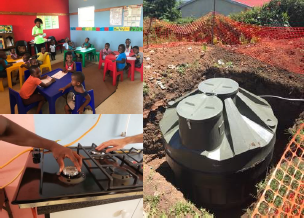Decentralized micro-biodigester systems for rural areas in South Africa
This is the third of a case study compilation to explore lessons on material and energy valorisation of waste within the framework of IEA Bioenergy Task 36.
South Africa’s rural areas have been historically characterised by persistent service delivery challenges, including lack of waste management services, poor access to reliable sanitation systems, inconsistent and unaffordable energy options. Micro digesters can provide affordable cooking gas, heating and lighting to rural communities thus supporting poverty alleviation and local economic development. Although the viability of biogas systems as decentralised waste management, sanitation, and energy solutions for rural areas within the Global South has been well documented within contemporary literature, biogas interventions within South Africa have not been successful for a variety of reasons, namely, limited research and implementation, despite a readily abundant supply of suitable feedstock within rural contexts. The purpose of this report is to contribute to the development of a best practice model for rural biogas provision in South Africa.

Figure. Typical micro bio-digester at a rural ECDC and improved biogas-stove in South Africa
This report presents the results of a study contextualised within two interrelated, but distinct, rural bioenergy projects located in the Ndwedwe Local Municipality (NLM), within the iLembe District Municipality in the KwaZulu-Natal Province, funded by the South African National Energy Development Institute (SANEDI) and the National Lotteries Commission (NLC). These two projects encompassed repairs to 26 existing household digesters and design and implementation of new integrated biogas provision and sanitation systems at five Early Childhood Development Centres (ECDCs). Utilising a mixed-methodological approach, interventions were evaluated on their socio-economic, energy, and sanitation outcomes, and an optimisation plan was implemented to address identified shortcomings. A detailed analysis of institutional barriers and drivers was also conducted as part of this project.
This report aimed to establish lessons learnt in the sustainability of operation and maintenance of the rural biogas systems. The results of a detailed stakeholder engagement with municipal officials, industry, and beneficiaries, aimed at identifying barriers and drivers to implementation and rolling out of these systems in rural and peri-urban contexts of South Africa.
Many factors hinder the adoption of biogas micro digesters technology in South Africa. The continued use of coal and fossil fuels as an energy source is a barrier to transitioning towards more sustainable energy sources, especially in rural areas. Other institutional barriers to the implementation of biogas micro digesters are politics, governance, technical, social-cultural, financial and economic, market-related, geographical and ecological factors.
Full Report: Task-36-case-study-Biodigesters-South-Africa


